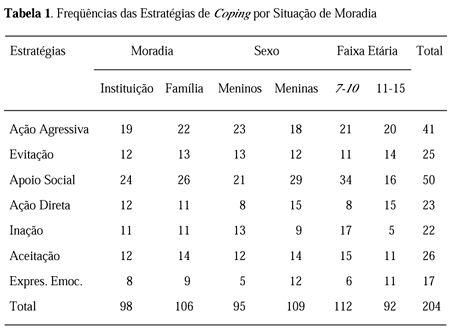The present study investigated coping strategies of 215 children and adolescents of both sexes, 7 to 15 years old, who attended public schools on the periphery of a southern Brazilian capital. About half the participants were living in state institutions for abandoned children (n=105, mean age=10.6). The remaining (n=110, mean age=9.9) attended the same schools but were living with their families. The participants were asked about recent stressing events and how they had dealt with the situation. The events were classified as involving either peers or adults. Content analyses led to the identification of seven categories of coping strategies: support seeking, aggressive actions, acceptance, avoidance, direct actions, doing nothing, and emotional expression. Analyses showed that younger children (seven to 10 years of age) used more strategies involving seeking support or doing nothing whereas older children used more direct action strategies. In situations involving adults, avoidance, acceptance, and emotional expression strategies were more frequent than in situations involving peers. In the latter, aggressive actions and support seeking strategies were used more often. These findings suggest that the age and the persons who are involved in a stressful situation may affect the use of strategies and that coping may be a situational process.
Coping strategies; Stressing events; Institutionalization


